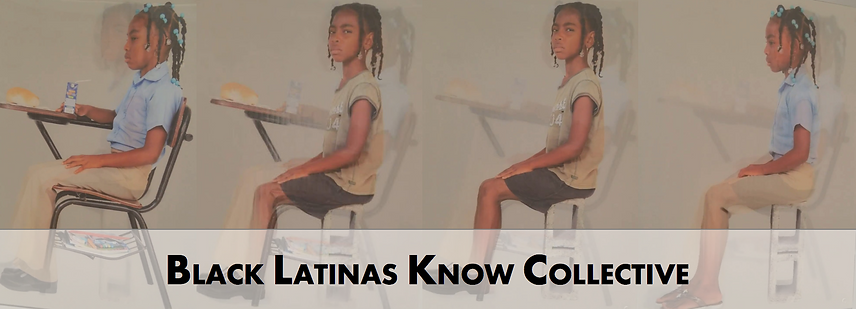On Harvard University, ALARI, and the Academy’s Ongoing Rejection of Black Latinas/os/xs, our scholarship, teaching, and community engagement
December 6, 2019
On December 11-13, 2019 the Afro-Latin American Research Institute (ALARI) at Harvard University will be hosting what they are calling “The ALARI First Continental Conference on Afro-Latin American Studies.” On its website, ALARI also purports to be “Building the New Field of Afro-Latin American Studies.” On the heels of a tenure denial of Harvard University’s and the ALARI Center’s lone Afro-Latina faculty, Professor Lorgia García Peña, the Black Latinas Know Collective denounce the silence from ALARI and the Hutchins Center for African & African American Research, as well as the historical erasure and systematic rejection of Black Latinas and our scholarship, teaching and community engagement within the academy.
The Black Latinas Know Collective (BLKC) calls attention to the following:
● This decision and the overall lack of institutional support for Black Latina scholars in the academy reproduces the same racial, gendered, ethnic, socioeconomic, sexual orientation, and intersectional forms of structural, institutional, and interpersonal oppressions that have historically excluded and exerted violence on Black Latina women.
● Those who do not support our presence in the academy fail to recognize the legacies of the very originators/producers of the study of Black Latinidad in the United States. While pioneer Black Latina led organizations like the afrolatin@ forum toiled with limited resources to build the field, the academy often recognizes and credits newcomers and outsiders. The lack of recognition is part of the claim that ALARI is “the first research institution in the United States devoted to the history and culture of peoples of African descent in Latin America and the Caribbean.” The afrolatin@ forum, founded by BLKC member Miriam Jiménez Román and the late Juan Flores in 2005, paved the way for the focus on Afro-Latinidad in the United States. The afrolatin@ forum has always conceived of Black Studies in the Americas hemispherically, as is clearly outlined in the afrolatin@ forum website, the canonical publication “Afro-Latin@ Reader: History and Culture in the United States” (Miriam Jimenez-Roman & Juan Flores, 2010: Duke University Press), and the afrolatin@ forum’s three conferences: the first held in December 9, 2005 titled “Race and Immigration: Conference on Challenges and Opportunity for the New American Majority”; the second in 2011 titled “Afro-Latin@s Now: Strategies for Visibility and Action”; and the third in 2014 titled “Afro-LatinA@s Now: Race Counts!”
● The academy persistently excludes Black Latina/o/x faculty from their ranks and its centers. A review of faculty profiles in departments throughout the country reveals that there are few visible racial and ethnic minorities and even fewer Black Latina/o/xs. It is crucial to recognize in Professor Lorgia Garcia Peña’s denial that she is not just the only Latina on the tenure-track at Harvard, but she, like many of us in our respective institutions, is the sole Black Latina. Departments, centers, agencies, and organizations claiming attention to Afro-Latinas/os/xs and Afro-Americans, including ALARI, should be committed to on-going and critical self-implicating reflexivity about their history and current practices. Their support and inclusion of Black Latinas/os/xs is crucial lest they replicate the very exclusions they purport to make visible and eradicate. The exclusion of Black Latinas/os/xs are occurring at all institutional levels, across all stages of a scholars’ journey, and in a variety of departmental settings--in area studies, ethnic studies, and in the traditional disciplines. It is time for these institutional divisions to pay attention to Black Latina/o/x representation so that these institutions are not led and inhabited exclusively by white and brown-mestizo Latina/o/x, Latin American, and Caribbean folk.
● The systematic patterns in hiring, tenure and promotion processes show how our existence is meant to remain as objects of study rather than knowledge producers. There is a structural refusal to accept our epistemologies, ontologies and methodologies as valid, as well as our position to speak from and to these truths from both a political and ontological stance. This is particularly salient in the academic freedom violations that reject our contributions as evidenced by enduring patterns of invisibilization, exclusion and gatekeeping, as well as in what counts as knowledge in the academy as evidenced by curricular requirements at the departmental and college levels. It is time that those of us who embody/experience the very truths we speak about in our intellectual work, those truths about racialized, gendered, and sexualized power structures and resistance within Latin America and the Caribbean, and across their diasporas, be at the center of this work.
We reject Harvard’s unjust denial of Lorgia García Peña’s tenure and demand that it rectify its decision by addressing the concerns outlined by students. We also call on the Academy to take swift and specific action to address the issues described in this letter, which are not limited to Harvard, but which are pervasive at institutions of higher education in the United States.
December 6, 2019

Comments